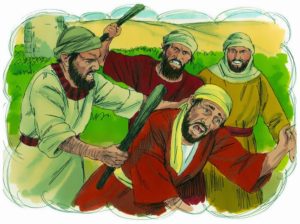I was going to save the following homily for a future date. The more I tried to write the more it felt as if I were making a sermon out of it, instead of giving the message God was trying to speak to me in the readings. So here it is.
My grandfather Jim had this beautiful farm in the mountains. When he first got the land, it was nothing but weeds, rocks, and briars. Over the years he slowly tamed that land. There were big piles of stones in the forest that my brother and I used to climb on. All of those rocks he had moved by hand out of the fields to prepare them. It was such a beautiful place too. Acres of manicured grass in the middle of the forests of Virginia. An apple orchard, a grape arbor, a garden filled with vegetables, not to mention all the animals. He would take us for a tour every time we came by. Letting us hold the baby chickens, ducks, geese, and doves. There was even this spectacular overlook that he had made with a firepit and some chairs. You could sit and watch the sunset over the lake hundreds of feet below. It was a beautiful place, a peaceful place.
A few years ago my grandfather passed away, and my grandmother was placed in a home. The executor of the estate sold the land to someone outside of the family, and things began to change. We were no longer allowed to visit. It wasn’t in the family anymore. I could see it from my dad’s house, less than a mile from his back porch. There was a real sense of loss. A sense of sadness that it was no longer ours. It was now someone else’s. I watched as other people walked those paths and climbed those rocks. There was a pain in my heart that I can’t really describe in words. Not jealousy. Just longing. I think that’s how the people must have felt in hearing this parable from Jesus. Fear that they might go through something like that. That they might long for something, they could never touch again.
This parable could bring that same fear out in us, and maybe it should. We too are now responsible for the vineyard of the Lord. Just like my grandfather worked long, hard hours clearing the land to make it a beautiful place; we are supposed to be using the gifts we have been given to produce fruit. Each of us is a unique person with our own set of talents. We are supposed to use them to make this world a better place, to show God’s love for everyone in it. How many times have we, like the people in the parable, been sent someone made in the image of Christ and treated them poorly?
Sure, we haven’t killed anyone. We didn’t beat them or throw them out. But what about with our words? Have we ever beaten someone verbally? Or killing their good name with slander? Have we ever rejected someone who has asked for help? Earlier we also said we can do wrong with our thoughts too. Have we thought poorly of someone? Been jealous or angry? Annoyed that someone doesn’t do things the way we want or has some habit that just gets under our skin? I know at times I am guilty of all these things. That parable doesn’t leave much hope. It seems hard.
How are we to make sense of it? If God is mercy and love, how can he take away the vineyard? He is mercy. He is love, indeed. So much so that here in a few minutes we are going to celebrate the gift that makes it possible for people so unworthy to stay working in the vineyard. God has indeed sent His Son to us time and time again, in the Holy Eucharist. Even though we continue to do exactly what they were guilty of, He gives us another chance. It’s as if he is saying “I am sending my son, surely they will treat him better this time.” As the priest elevates the precious consecrated host in a few moments, realize that this right here is God saying to you “I want to see your fruit.”
Again I say, God is mercy. God is love. But God is also justice. Ronda Chervin once said “If you want to see the infinite love and mercy of God, look at Heaven. If you want to see His Justice, look at Hell.” Now, in this life, at this moment is the time to start producing a harvest.


